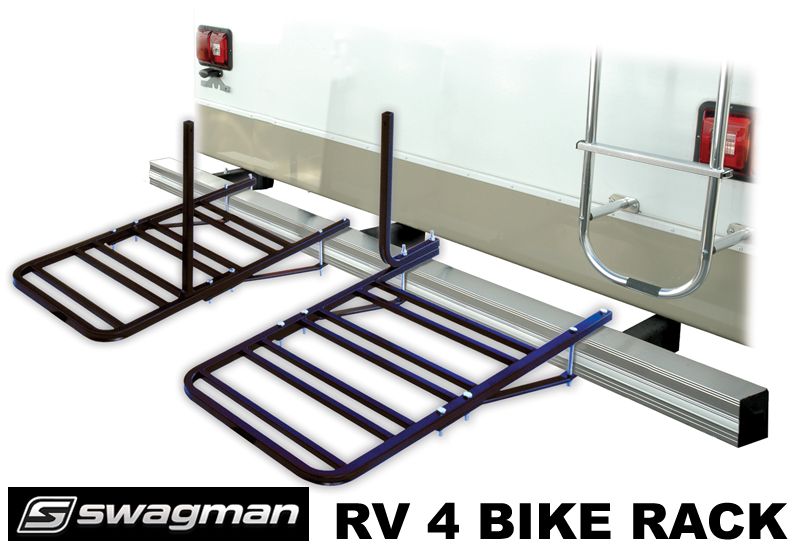A bike rack might seem a simple purchase — it holds your bikes above the gravel, and that’s good enough, right? But few thing are simple when it comes to the accommodations for your RV. You want both the bike and the rack to last for as long as possible without causing any sort of damage, and there a few basic decisions you’ll have to make when planning for this purchase.
The right RV bike rack must be within your price range, hopefully be rated highly by other buyers, and most importantly, be compatible with your vehicle and the bikes you transport. And that’s just the beginning. So let’s get started.
As DoItYourselfRV notes, there are four major types of RV bike racks, all of which mount to your vehicle in different ways.
Let’s review the pros and cons of each of the four options, with research based on this article from DoItYourselfRV:

You’ll need several U bolts to secure this rack to the bumper, which should be well-attached to the RV so the bike’s weight won’t cause too much strain. Generally, these are very easy to install so long as you pick a model that fits your size bumper. Strong bumpers are most commonly found on fifth wheel trailers, travel trailers and pop-up campers.
The only major considerations for this model are the weight distribution and the added length. It could shift the RV’s balance unfavorably toward the back end, and make it more difficult to maneuver and park.
Popular models include the Swagman two or four bike RV bumper rack and the RV bumper two-bike carrier.

As the most popular bike rack option, the hitch rack therefore offers the most variety. You can easily attach one of these to the front or back of an RV or to the rear of a trailer, so it’s exceptionally simple to transfer this rack from one vehicle to another without having to worry very much about compatibility. The only requirement is that the vehicle have a pre-installed trailer hitch with a square port for the rack to attach. If you don’t have one, you’ll have to purchase and install one separately if you wish to use one of these bike racks.
Depending on which rack you choose, these will hold as few as two or as many as six bikes per rack. Like the bumper bike rack, the only major drawbacks here are in offset weight balance and added vehicle length. If these aren’t a concern for you, this may likely be your best option.
Models of this rack are numerous but a few highlights include the Allen Sports Deluxe Hitch Mount Racks and the Yakima Double Down Ace Hitch Rack.

Typically, most ladder bike racks will be compatible with any RV or trailer/camper that has a ladder, as they’re made to accommodate as many sizes as possible. Check for compatibility information on the box or in the item description anyway, or simply purchase the rack from a retailer with a good return policy.
These racks generally hook or strap onto the ladder’s steps without any use of tools, so they’re easy to install and take up very little space. The amount of bikes you can carry with this method, however, is generally limited to two. The bikes may also be hard to access unless your ladder is low to the ground, or you are tall enough to reach without difficulty.
Ladder rack models to consider include the Surco ladder-mounted bike rack and the Swagman two-bike RV ladder rack.

This uncommon setup allows you to store a bike in front of your trailer on camper via a mount attached to the tongue, near where the trailer attaches to a vehicle hitch. Often you’ll have to rely on your own know-how and familiarity with metal-working to create a custom rack if you choose to go with this method. Trailer tongues come in many shapes and sizes, so it might be hard or simply expensive to find or make one that provides for your exact needs. Despite the difficulties of installation and purchase, people with these setups tend to “rave about its convenience and peace of mind in comparison to the other options,” according to DoItYourselfRV.
There are only a few purchasable options of note here, such as the Camping World bike bunk and the Arvika DFX series mount and RV bike rack.
In all four of these categories, there are models that secure bikes via their wheels with rails and tie-downs and via their top bars rested on carry arms. The latter is more common and sometimes has features that can fold out of the way for portability, but the former makes loading and unloading the bikes easier without upsetting the entire setup.
For a more in-depth summary of all these features, read the source article at DoItYourselfRV.com.